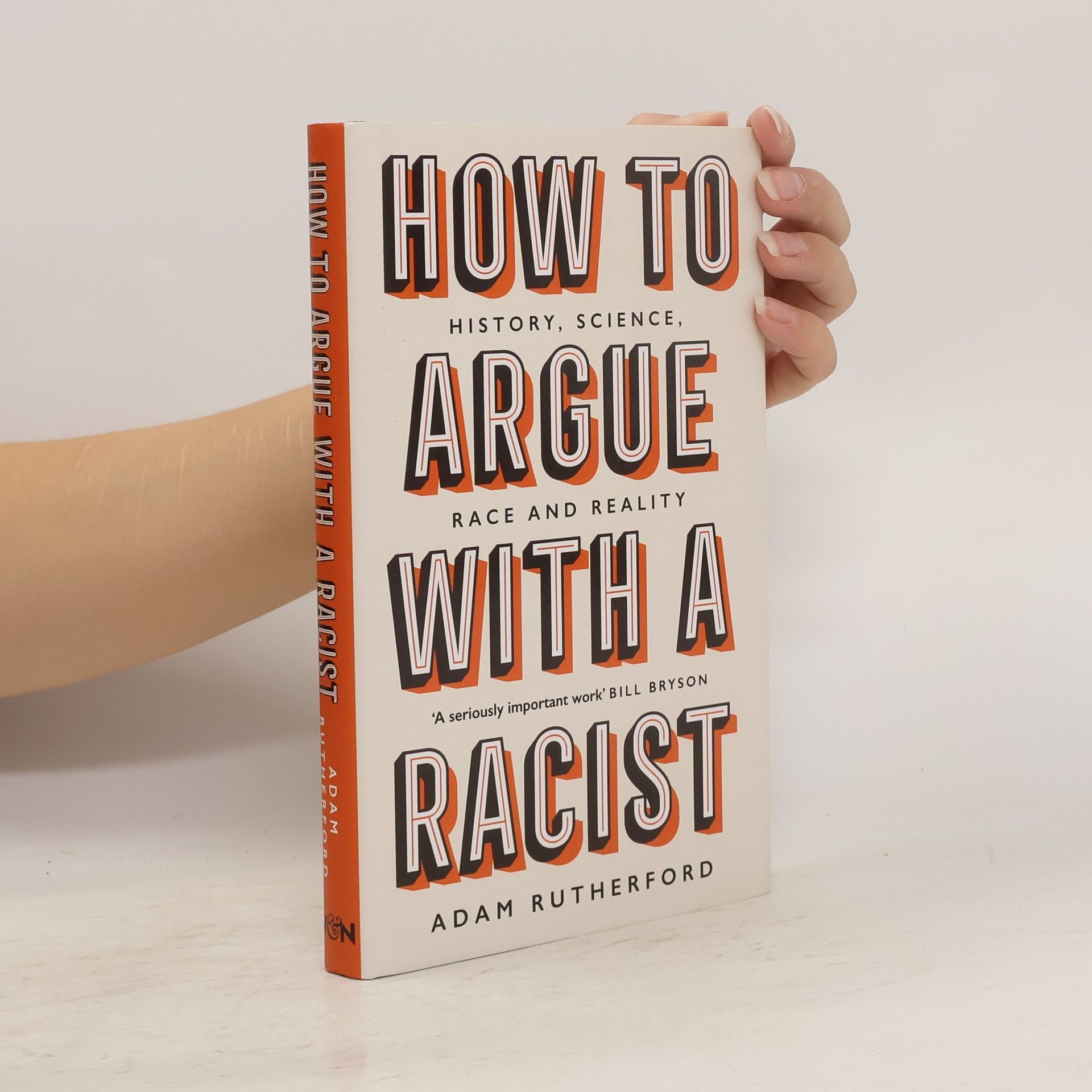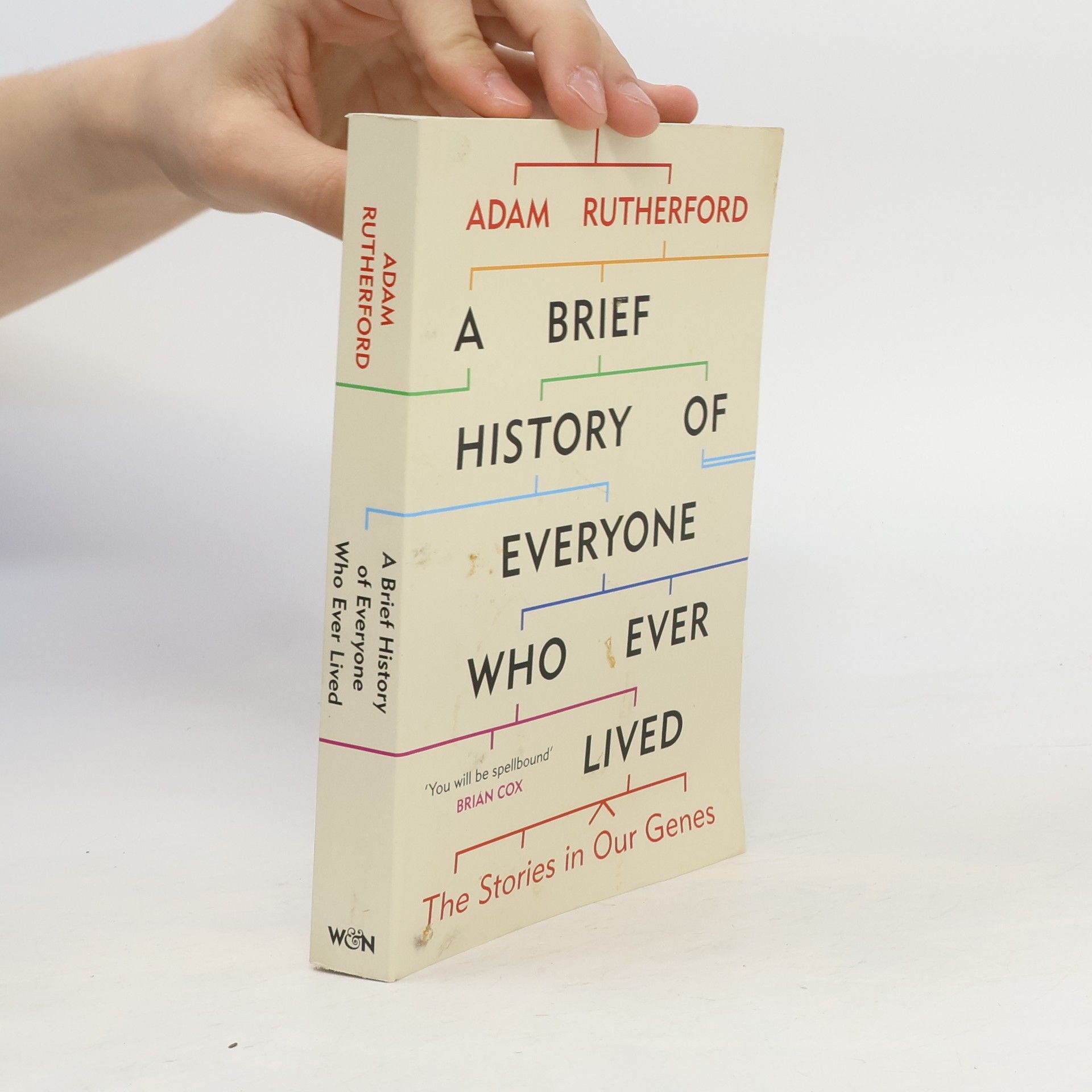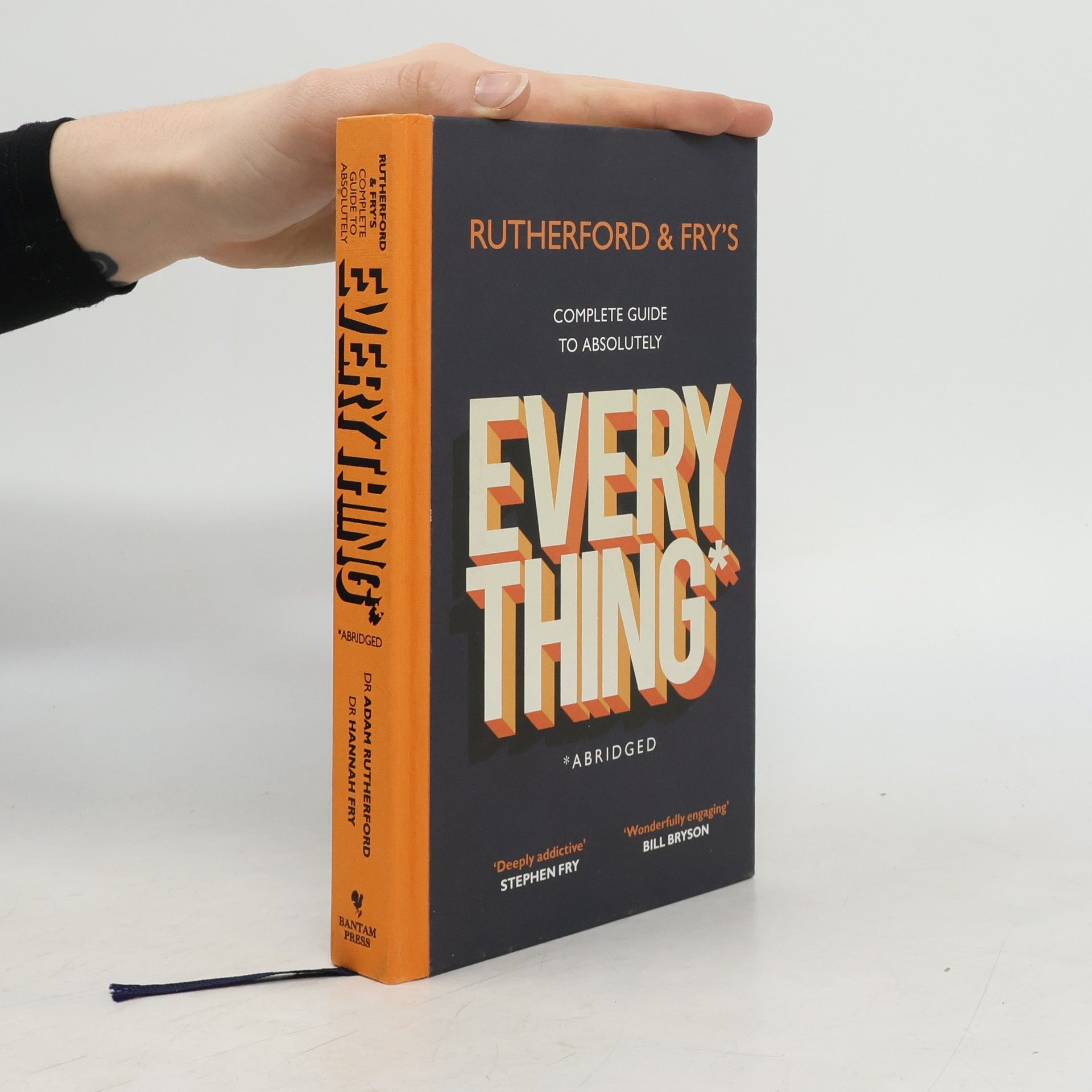Who do you think you are?Have you ever thought about who you might be related too? What if we told you were related to vicious Vikings, Roman emperors, great kings and feisty queens?Well, your majesty, you are. In fact, everyone is. And geneticist Adam Rutherford is here to tell you why.On this extraordinary adventure through millions of years of human history, young readers will learn the story of our species. They will meet kings and queens. They will see how humans migrated far and wide around the globe. And they will discover that no matter what skin colour you have, language you speak or place you are from - we all share the same small pool of ancestors.Armed with a deeper understanding of science and history, readers will learn how to dismantle common myths of who we really are - like what race is, where we come from, and what it means to be human.Mind-boggling, entertaining and illuminating, this is the epic story of you and everyone who has ever lived!
Adam Rutherford Livres
Adam Rutherford est un auteur britannique axé sur la communication scientifique. Son travail explore la génétique et les origines de la vie, dans le but de rendre des sujets scientifiques complexes accessibles à un large public. Rutherford utilise sa maîtrise du récit pour captiver et éduquer les lecteurs sur notre héritage biologique. Son écriture est reconnue pour sa clarté et son style captivant, ce qui en fait une voix précieuse dans la littérature scientifique.







A short, highly directed guide to an area of science that is little understood but increasingly part of public discourse by the Sunday Times bestselling author of HOW TO ARGUE WITH A RACIST
In Rutherford and Fry's comprehensive guidebook, they tell the complete story of the universe and absolutely everything in it - skipping over some of the boring parts. This is a celebration of the weirdness of the cosmos, the strangeness of humans and the fact that amid all the mess, we can somehow make sense of life. Our brains have evolved to tell us all sorts of things that feel intuitively right but just aren't true- the world looks flat, the stars seem fixed in the heavenly firmament, a day is 24 hours... This book is crammed full of tales of how stuff really works. With the power of science, Rutherford and Fry show us how to bypass our monkey-brains, taking us on a journey from the origin of time and space, via planets, galaxies, evolution, the dinosaurs, all the way into our minds, and wrestling with some truly head- scratching questions that only science can answer- What is time, and where does it come from? Why are animals the size and shape they are? How horoscopes work (Spoiler- they don't, but you think they do) Does my dog love me? Why nothing is truly round
Rutherford and Fry's Complete Guide to Absolutely Everything (Abridged)
- 304pages
- 11 heures de lecture
In Rutherford and Fry's comprehensive guidebook, they tell the complete story of the universe and absolutely everything in it - skipping over some of the boring parts. This is a celebration of the weirdness of the cosmos, the strangeness of humans and the fact that amid all the mess, we can somehow make sense of life. Our brains have evolved to tell us all sorts of things that feel intuitively right but just aren't true- the world looks flat, the stars seem fixed in the heavenly firmament, a day is 24 hours... This book is crammed full of tales of how stuff really works. With the power of science, Rutherford and Fry show us how to bypass our monkey-brains, taking us on a journey from the origin of time and space, via planets, galaxies, evolution, the dinosaurs, all the way into our minds, and wrestling with some truly head-scratching questions that only science can answer- What is time, and where does it come from? Why are animals the size and shape they are? What is a thought? How horoscopes work (Spoiler- they don't, but you think they do) Does my dog love me? Why nothing is truly round Do you need your eyes to see?
'A brilliant, authoritative, surprising, captivating introduction to human genetics. You'll be spellbound' Brian Cox This is a story about you. It is the history of who you are and how you came to be. It is unique to you, as it is to each of the 100 billion modern humans who have ever drawn breath. But it is also our collective story, because in every one of our genomes we each carry the history of our species - births, deaths, disease, war, famine, migration and a lot of sex. In this captivating journey through the expanding landscape of genetics, Adam Rutherford reveals what our genes now tell us about human history, and what history can now tell us about our genes. From Neanderthals to murder, from redheads to race, dead kings to plague, evolution to epigenetics, this is a demystifying and illuminating new portrait of who we are and how we came to be. *** 'A thoroughly entertaining history of Homo sapiens and its DNA in a manner that displays popular science writing at its best' Observer 'Magisterial, informative and delightful' Peter Frankopan 'An extraordinary adventure...From the Neanderthals to the Vikings, from the Queen of Sheba to Richard III, Rutherford goes in search of our ancestors, tracing the genetic clues deep into the past' Alice Roberts
Introduction -- Skin in the game -- Your ancestors are my ancestors -- Black Power -- White matter -- Conclusion and recapitulation.
How to Argue With a Racist
- 224pages
- 8 heures de lecture
THE SUNDAY TIMES BESTSELLER AS HEARD ON BBC RADIO 4 BOOK OF THE WEEK 'The ultimate anti-racism guide' Caroline Criado Perez 'Seriously important' Bill Bryson 'A fascinating debunking of racial pseudoscience' Guardian Racist pseudoscience may be on the rise, but science is no ally to racists. Instead science and history can be powerful allies against bigotry, granting us the clearest view of how people actually are, rather than how we judge them to be. HOW TO ARGUE WITH A RACIST dismantles outdated notions of race by illuminating what modern genetics can and can't tell us about human difference. It is a vital manifesto for a twenty-first century understanding of human evolution and variation, and a timely weapon against the misuse of science to justify racism. Updated edition includes a new Preface from the author
The book of humans
- 272pages
- 10 heures de lecture
WHAT MAKES US HUMAN? Waging war? Sex for pleasure? Creating art? Mastery of fire? In this thrilling tour of the animal kingdom, Adam Rutherford tells the story of how we became the unique creatures we are today. Illuminated by the latest scientific discoveries, THE BOOK OF HUMANS is a dazzling compendium of what unequivocally fixes us as animals, and reveals how we are extraordinary among them.
Bin ich etwas Besonderes?
Was uns von den Tieren unterscheidet – und was nicht
- 238pages
- 9 heures de lecture
Vor etwa 45.000 Jahren haben wir Menschen uns mit der Schaffung von Kultur, Werkzeugen, Symbolik und Kunst von unseren Vorfahren und Ursprüngen entfernt. Diese „kognitive Revolution“ gab uns das Gefühl, dass wir etwas Besonderes sind. Schriftsteller, Wissenschaftler, Philosophen und Religionen staunen seit Jahrtausenden über unsere Brillanz. Dennoch sind wir mit dem Rest der Natur durch Gene, Anatomie und Physiologie verbunden und in einer gemeinsamen Evolution verwurzelt. Alle Arten sind einzigartig, aber sind wir einzigartiger als andere Tiere? Diese Frage geht an die Wurzel dessen, was wir sind. Doch viele wissenschaftliche Erkenntnisse haben im Laufe der Zeit Zweifel an der Sonderstellung des Menschen aufkommen lassen. Dinge, die wir einst als einzigartig menschlich betrachtet haben, sind es nicht. Wir sind nicht die einzige Spezies, die z.B. Pläne für die Zukunft schmiedet, vergangene Entscheidungen bereut, um verlorene Leben trauert und Sex aus anderen Gründen als der Zeugung von Nachkommen hat.
Kniha se zabývá tím, co dnes dokážeme vyčíst ze struktury lidských genomů, což nám odhaluje nejen naši minulost, ale především budoucnost. V první části autor analyzuje historii lidstva od prvních hominidů po současného Homo sapiens, přičemž využívá DNA získanou z fosilních nálezů a lidských ostatků. Ukazuje, že vývoj lidstva byl mnohem složitější, než jsme si dosud mysleli. Druhá část se zaměřuje na to, kým jsme dnes, a na to, co výzkum DNA odhaluje o rodinách, národech, rasách, zdraví a psychologii. Genomika má potenciál zásadně proměnit medicínu, ale s tím souvisejí i etické otázky ohledně využívání těchto poznatků. Genomika se rychle vyvíjí a každý týden přináší nové výsledky, jako jsou objasnění dědičných chorob, poznatky o virech a úpravy genomů pomocí metody CRISPR-Cas9. Tato metoda zásadně mění možnosti praktického využití genomiky a vyvstává otázka, jaká omezení by si lidstvo mělo stanovit při jejím používání. Máme právo upravovat lidský genom? Jsme schopni bezpečně a přesně provádět genové terapie? A jaké morální a etické otázky s tím souvisejí? Jaké hrozby mohou tyto úpravy představovat pro budoucí generace?



